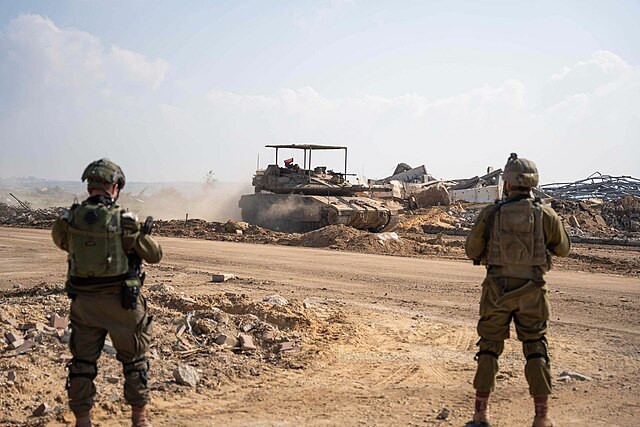The Israeli Defense Forces (IDF) have intensified their military operations in Gaza, leading to significant casualties and widespread displacement among Palestinian residents. On Monday, the IDF announced a reduction in the so-called "humanitarian zone" in Khan Younis, prompting thousands to flee their homes. The move comes amid ongoing efforts to neutralize Hamas targets in the densely populated southern city.
The IDF's decision to shrink the humanitarian zone followed intelligence reports indicating that Hamas militants had embedded themselves in the eastern neighborhoods of Khan Younis. This fresh ground assault mirrors previous operations in northern and central Gaza aimed at preventing Hamas from reestablishing its presence. As the military push continues, the death toll has risen, with the Hamas-run government media office reporting 89 deaths and 263 injuries as of Tuesday.
Dr. Mohammad Saqer, a spokesperson for Nasser Medical Complex in Khan Younis, told CNN that the hospital had issued death certificates for 75 Palestinians, predominantly women and children, since the operation began. The facility is overwhelmed with more than 200 injuries, many of which are critical.
The IDF claimed on Tuesday that its aircraft had targeted over 50 terrorist infrastructure sites, including weapons storage facilities, observation posts, and tunnels used by Hamas. Additionally, Israeli forces reported killing dozens of terrorists in targeted strikes and close-quarters combat in Rafah, further south. These claims could not be independently verified by CNN.
The humanitarian situation in Gaza continues to deteriorate as thousands flee the ongoing violence. CNN footage from Khan Younis depicted scenes of chaos and desperation, with residents-many on foot or using donkey carts-carrying their belongings through the streets. One woman, carrying a box, implored, "Film this, film it so people can see what's happening to us."
Children were seen crying and carrying blankets, while heavy gunfire added to the panic. Mohammad Abdul Jawad, a resident, told CNN, "The (Israeli) army called us in the morning, ordering people to evacuate. They said go to the safe area, but there is no safe area in all of the Gaza Strip."
Some evacuees expressed frustration with Arab states for not providing sufficient support. Um Hazem Sammoun, walking with her children, questioned, "Where are the Arab world and the Arab leaders? Let them come look at our children."
Anger was also directed at Hamas. One woman told CNN, "Every day a new order to evacuate. There is no food, drinks, or safety. We are only evacuating from one place to another. Maybe this way Hamas will be happy. Hamas forced us to leave, not the Israelis."
An enraged man addressed Hamas leadership, including Yahya Sinwar and Ismail Haniyeh, demanding, "Do you see our suffering? What do you want from us? What have you brought us?"
The UN Human Rights Office (OHCHR) criticized the evacuation order as "confusing" and insufficiently clear, noting it increased the danger to civilians. The UN Relief and Works Agency (UNRWA) stated that the new orders would exacerbate the suffering and displacement of Palestinian families. "People in Gaza are exhausted, living in inhumane conditions, with no safety at all," the agency posted on X.
The Gazan Civil Defense Directorate reported that the humanitarian zone had been reduced from 45 to 28 square kilometers, squeezing 1.7 million people into a tiny area with limited access to shelter or aid. This reduction raises serious concerns about Israel's compliance with international law, which mandates minimizing harm to civilians.
As the conflict rages, efforts to broker a ceasefire continue. Israeli Prime Minister Benjamin Netanyahu, currently in Washington, expressed optimism about a potential deal to secure the release of hostages held by Hamas. "The conditions (for a deal) are undoubtedly ripening. This is a good sign," Netanyahu said during a meeting with families of hostages.
Months of mediation by Egypt and Qatar have gained momentum recently, with discussions involving hostages being exchanged for Palestinian prisoners. An Israeli negotiation team is scheduled to arrive in Cairo to resume talks.




